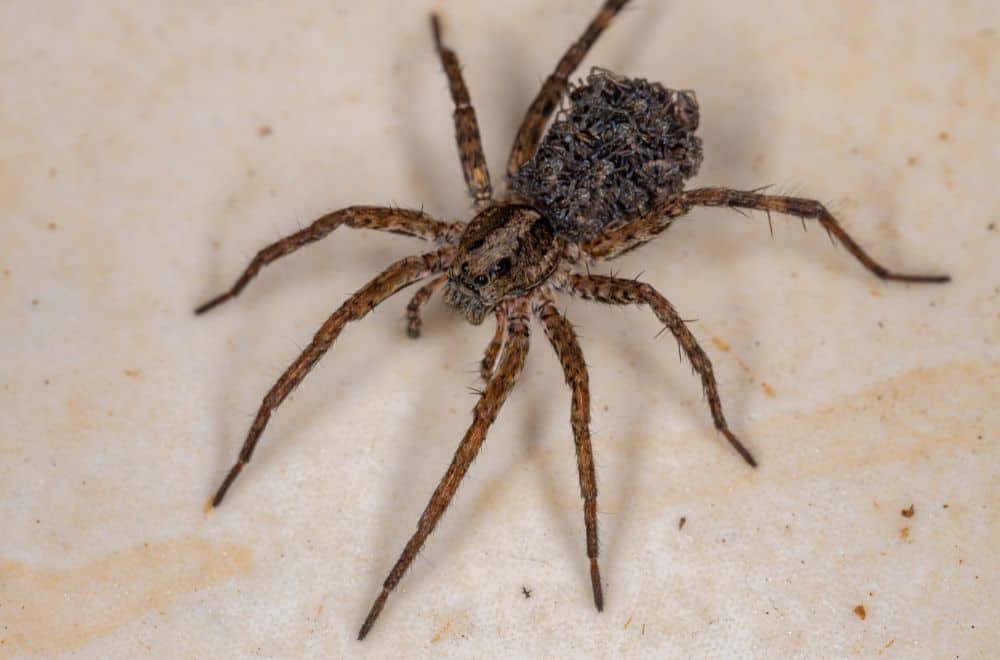If you’re even slightly arachnophobic, the last thing you’ll want to encounter is a wolf spider because, with their long fangs and large hairy bodies, these spiders can look pretty terrifying, even to those who aren’t usually scared of spiders.
Unfortunately, they’re also a common spider across the US, so you have a good chance of coming across them from time to time – and to help you evict them if they decide to move into your home, in this post we talk about how to get rid of wolf spiders in the basement.
What are wolf spiders?
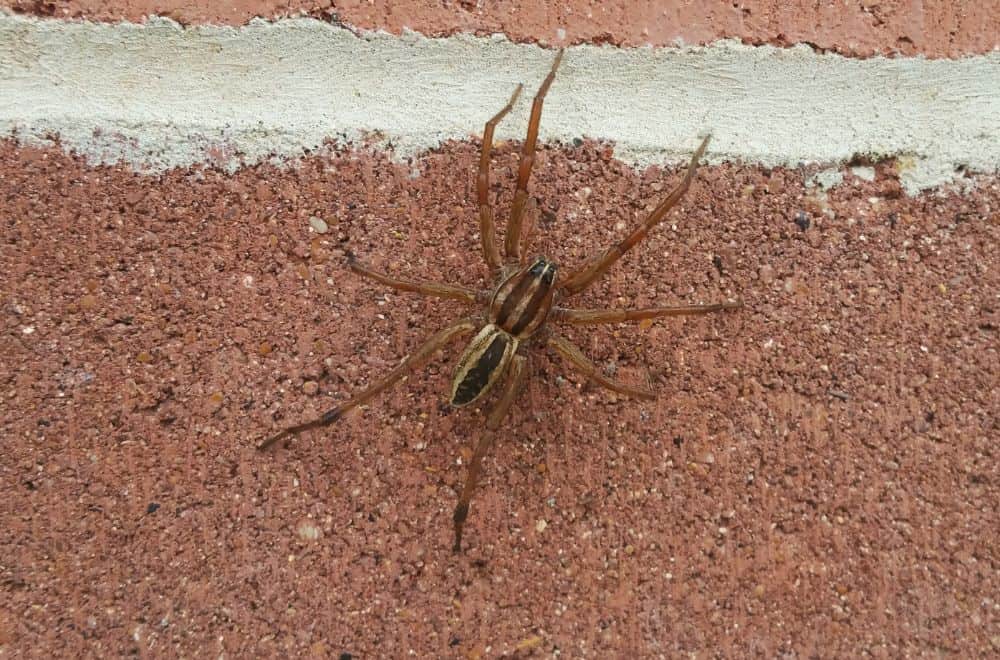
Before we outline what you need to do to rid yourself of wolf spiders in your basement, let’s start by talking a bit about what wolf spiders are so we know what kind of animal we’re dealing with.
Wolf spiders are any of a large number of species belonging to the Lycosidae family, and they are notable in that they don’t spin webs to catch their prey but instead, actively hunt them on the ground.
The ones you are most likely to see in North America can have bodies of up to around an inch in length, although the males are usually only about a quarter of an inch long.
You can identify them by their large, hairy bodies, their eight eyes and their prominent fangs – they are often mistaken for tarantulas. They are usually gray-brown in color and often have striped patterns on their backs, which helps them stay hidden in the undergrowth.
The natural habitats of wolf spiders are places like grasslands and meadows, but they are adaptable creatures and can sometimes move into human habitations to escape the cold.
They are hardy spiders that are fast and agile, and they also have good eyesight, all of which makes them excellent hunters. However, they are usually timid when confronted by humans and prefer to hide rather than seek confrontation.
However, mother spiders protecting their young can also react aggressively if threatened.
Are wolf spiders dangerous?
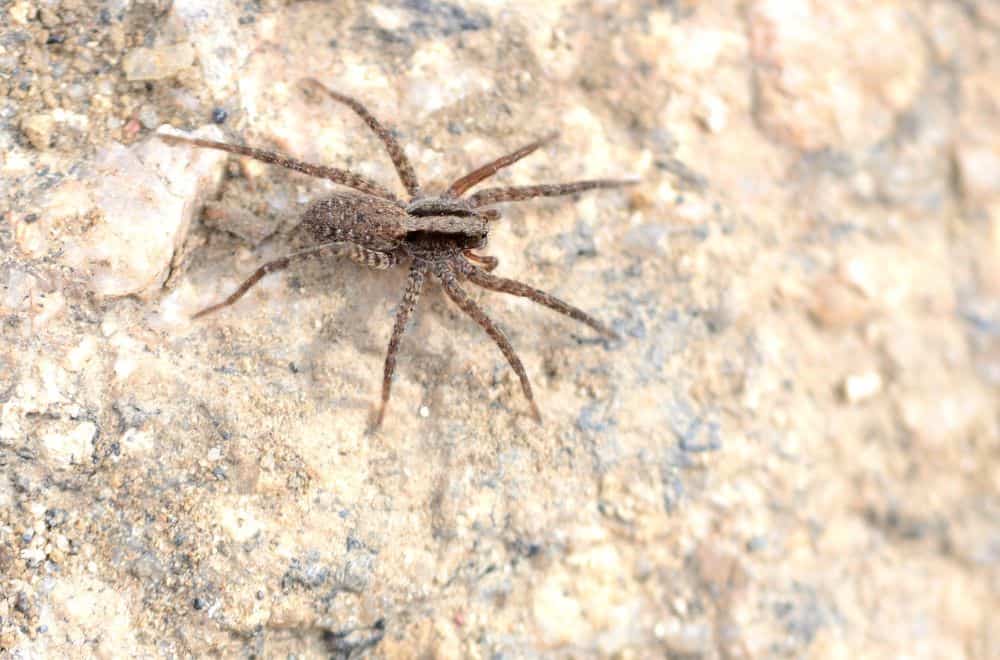
Wolf spiders may seem intimidating, frightening creatures to many people, especially if you come face to face with one unexpectedly, but are they dangerous to humans?
Reassuringly, the answer to this question is no, they’re not – or at least the ones in North America aren’t.
Some species in other parts of the world are suspected to have stronger venom, but although they can give you a painful bite about equivalent to a bee sting, the species present in the US are not considered dangerous.
How can you get rid of wolf spiders from your basement?
If you think you have wolf spiders in your basement, there are several things you can try. Some of them are natural methods that don’t require the use of any toxic chemicals, but if all else fails you can also try pesticides. Here’s the list.
1. Set sticky traps
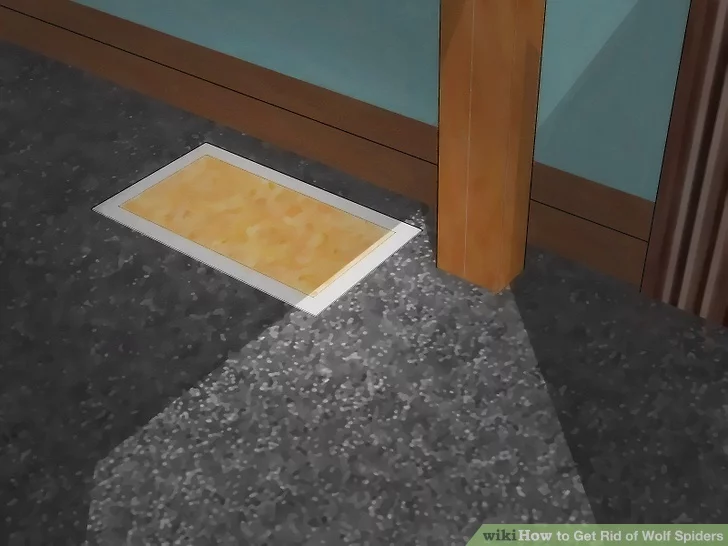
Image Credit: wikihow
One of the most effective ways of catching wolf spiders is to lay down sticky traps for them wherever you suspect them of being present.
This is especially useful against wolf spiders as opposed to other types of spider since wolf spiders crawl along the ground, making it more likely they will step on a trap.
Simply buy some commercial traps and lay them down in strategic places in your basement – and elsewhere – and the spiders will walk over them when they come out to hunt.
Once they step on the trap, they will get stuck and won’t be able to escape, and then all you need to do is collect the traps and kill the spiders.
2. Sprinkle diatomaceous earth or boric acid powder
Another effective way to kill wolf spiders and many other pests is to spread diatomaceous earth where you think they hang out.
Diatomaceous earth is harmless to humans or pets, but when it comes into contact with spiders, it erodes their bodies. Wolf spiders that walk in it will get it on their legs and will then rub it over their bodies, which will cause them to die.
Another option is to use boric acid, another powder that works in a similar way.
However, while boric acid is not harmful to adult humans, it might not be a good idea to use around kids or pets – so if you have children or animals in your home, diatomaceous earth is the better option.
Note that these substances may also help reduce other insect populations in your basement, and since the wolf spiders rely on these as prey, this will also encourage any wolf spiders to move out and search for their next meal elsewhere.
3. Spray essential oils

Wolf spiders hate certain essential oils, herbs and spices, so these can be used as a natural way to drive the spiders from your home.
Spreading things like cedar, cinnamon, citrus, peppermint or tea tree oil in the areas you think they are inhabiting may cause them to move out of your basement on their own.
4. Hunt them down
One option is simply to hunt them down one by one, and if you don’t have a large infestation, this can be something to consider.
You’ll need to go down into your basement at night when they’re most active and take a powerful torch with you to help search in dark nooks and crannies. Their eyes are reflective, so this will also help you spot them.
Once you find them, you can simply kill them with a broom or by treading on them. Alternatively, you might try to capture them in containers, but if you do this, you should wear gloves to prevent them from biting you.
If you decide to trap them, you can then just release them somewhere far from your home.
However, hunting them down like this is not likely to be effective if you have lots of clutter in your basement since they will have too many places to hide.
5. Spread pesticide

The simplest way to kill wolf spiders is to spray pesticide, and choosing one that’s specifically designed for wolf spiders is the most effective.
Some pesticides just kill the spiders that are present while others have a residual effect that can continue killing spiders for up to 90 days or more.
If you choose this method, read the instructions carefully before applying the pesticide and make sure you wear proper protective equipment when you do it.
How can you discourage wolf spiders from entering your home?
Evicting wolf spiders from your basement is not necessarily such a hard job, but preventing them from moving in there in the first place is far preferable.
In addition, once you’ve got them out, you’ll want to ensure more wolf spiders don’t take their place – so now let’s look at what you can do to stop wolf spiders getting into your basement, both outdoors and indoors.
Outside
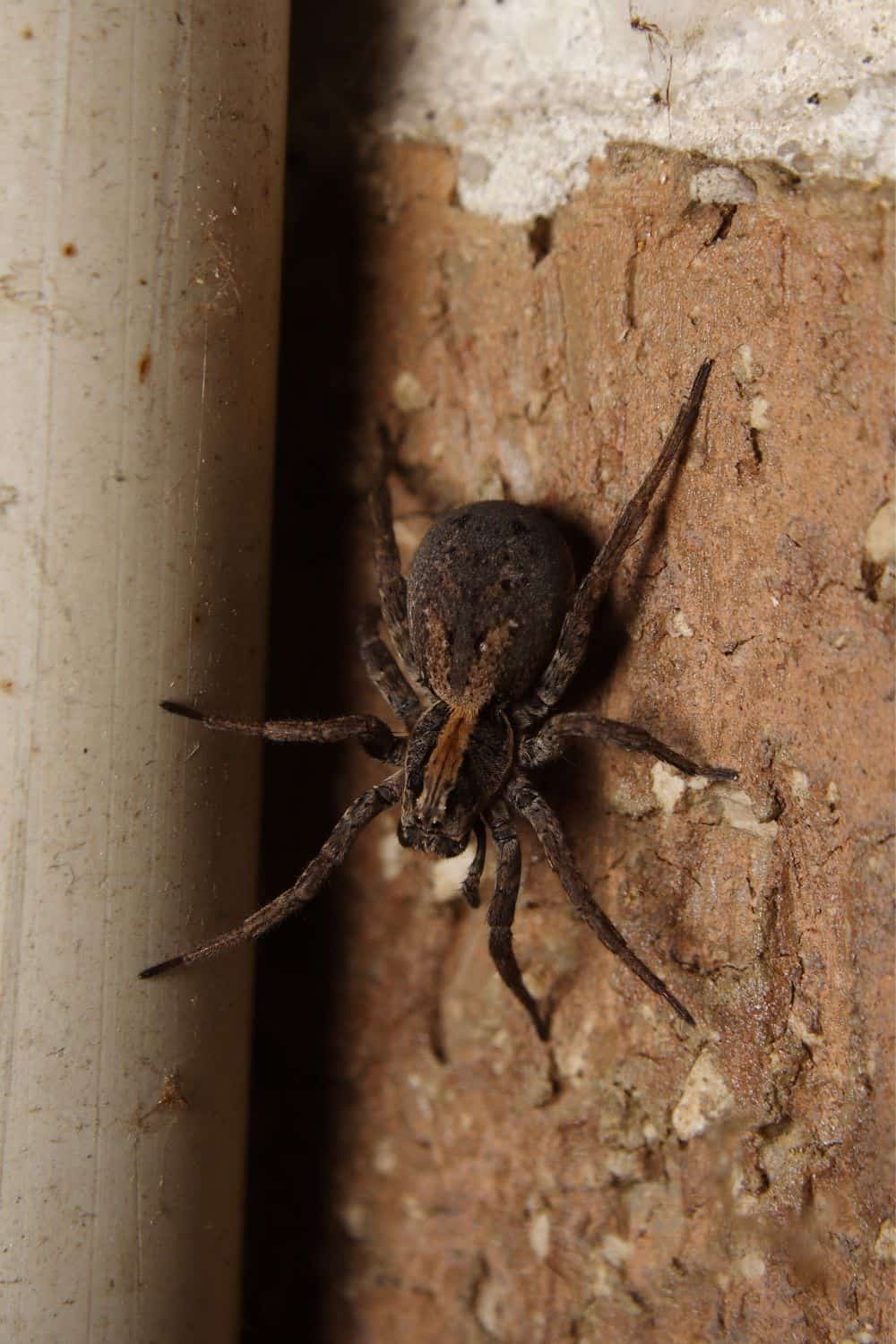
There are several simple actions you can take outdoors that will help prevent wolf spiders from moving into your basement. Here’s the list.
- Remove clutter from around your home
Remove outdoor clutter from around your home to minimize the hiding places available for wolf spiders. This might include raking up leaves, removing piles of bricks and getting rid of anything else that can provide shelter for these spiders.
- Remove heavy vegetation
Removing heavy or overgrown vegetation from your yard will also reduce the number of places these spiders have to hide, making it a less attractive proposition for them to explore.
- Move woodpiles from near your house
Similarly, if you have firewood near your house – or perhaps even leaning up against the wall of your house – you should move it further away since this provides the perfect place for wolf spiders to hide.
Be careful when moving it since wolf spiders and others may already be hiding there.
- Install sodium vapor lights
White lights attract insects to your home, and these in turn will attract spiders – but if you change to yellow sodium vapor lights, fewer insects will be attracted, so the spiders won’t have anything to eat.
Furthermore, since wolf spiders are nocturnal, the lights will discourage them from coming near your home, making this a doubly effective deterrent.
- Seal all cracks and entry points to your house
Carefully sealing all cracks, crevices and other gaps that spiders might enter through from the outside is a good way to stop wolf spiders entering your home.
- Install insect screens around vents
Any vents around the lower part of your home should be covered with mesh to stop spiders getting in that way. These spiders are ground species, so they won’t often climb up your house looking for other ways in, but at least the vents lower down need to be blocked.
Inside
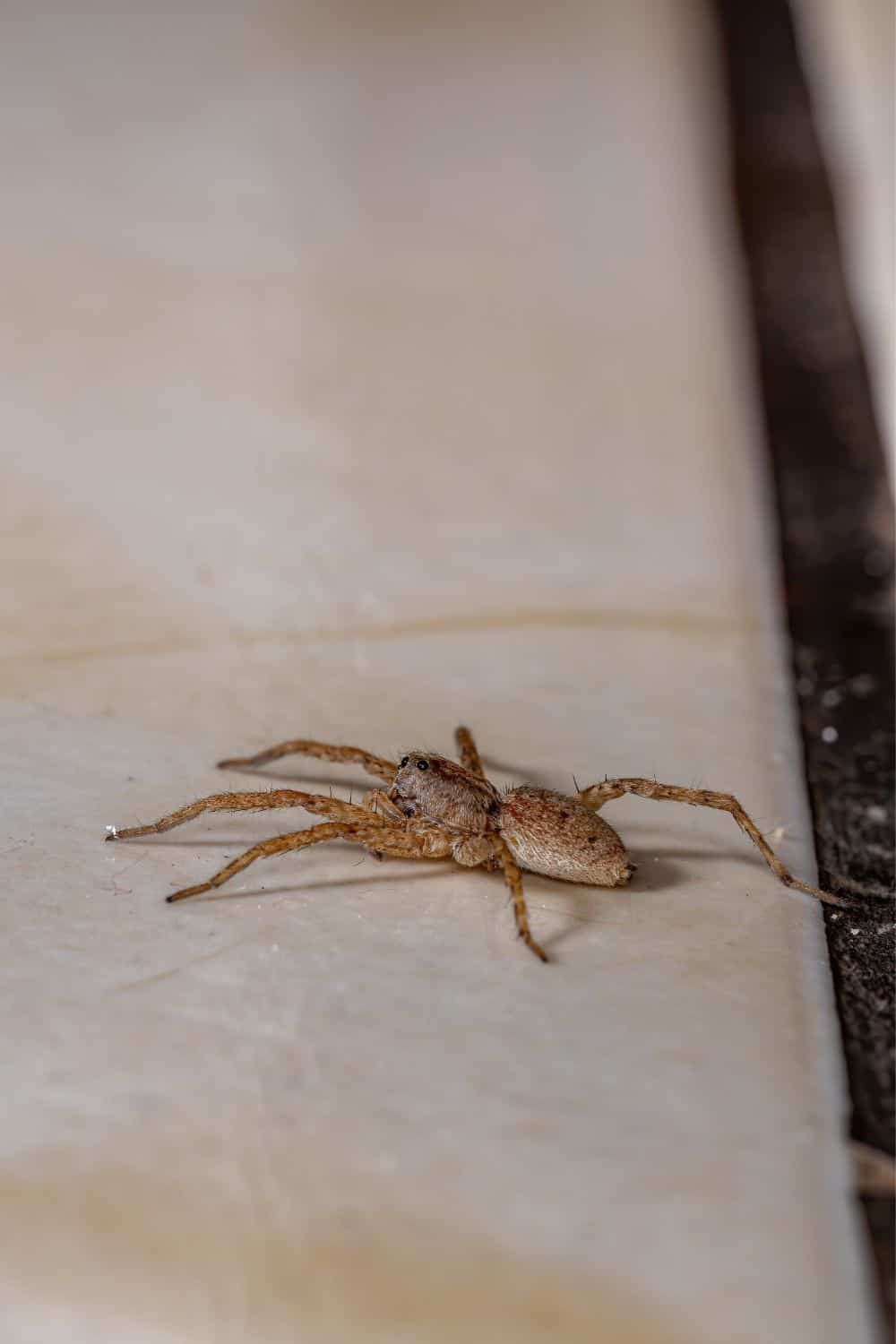
There are several things you can do inside to prevent wolf spiders from taking up residence. Here are some suggestions.
- Seal gaps from the inside
As well as sealing the gaps from the outside, you should also go around your basement methodically looking for any gaps or other access points that spiders can come in through.
Remember that wolf spiders can squeeze through even the tiniest of spaces, so work your way around, blocking up all the gaps you see. Using caulk to do this is one of the best and most effective ways.
- Sweep or vacuum regularly
Wolf spiders like to stay where it’s quiet and where they’re not disturbed, so if you sweep or vacuum your basement frequently, they won’t feel safe there and will move out.
If you can give your basement a thorough clean at least once a month, it will help – but once every two weeks would be even better.
If the basement is kept clean, the spiders will not find the place so appealing in the first place either.
- Remove indoor clutter
Just as removing clutter and hiding places outside makes your yard less attractive to wolf spiders, so does removing clutter from indoors.
Basements tend to be the kinds of places where clutter accumulates, but if you can remove as much as possible, you won’t leave the spiders anywhere to hide, so they won’t set up home there. And if they’re already in, they’ll probably decide to leave.
- Remove cardboard boxes
Similarly, you should also remove cardboard boxes from your basement since these are favorite places for wolf spiders to shelter. Be careful when you move them though – because spiders might already be hiding inside.
FAQs
What should you do if a wolf spider bites you?
If a wolf spider bites you, there’s usually nothing to worry about. It will probably hurt for a couple of hours, but this will soon wear off. Afterwards, you may have a slight swelling for one or two days along with some itching, but it will pass. Ice can be used for the pain.
However, if you display any more serious reactions, you should consider seeing a doctor.
What do wolf spiders eat?
Wolf spiders usually feed on any insects and other invertebrates they can catch. This is why removing their prey species from in and around your home will help reduce wolf spider populations.
Which is the largest species of wolf spider in the US?
The largest wolf spider is the Carolina wolf spider, Hogna carolinensis. Adult females of this species can have bodies of over an inch in length. Despite their name, they are found throughout much of North America.
Which are the most effective pesticides to use against wolf spiders?
If you decide to go down the pesticide route, the most effective ones are those containing pyrethroids. They are very common and easy to find, and they can be used to kill all kinds of spider.
Not dangerous – but not fun to have in your basement
Although they are not considered dangerous, wolf spiders are not usually welcome visitors in basements, especially for those who are afraid of arachnids.
However, by combining the methods we’ve outlined here for capturing or killing them with the ideas for preventing them from moving in, it shouldn’t be too hard to make sure your interactions with these scary-looking spiders are kept to a minimum.
